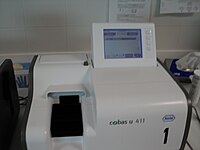
Photo from wikipedia
Hydrogels are promising material candidates in engineering soft robotics, mechanical sensors, biomimetic regenerative medicine, etc. However, developing multinetwork hydrogels with high mechanical properties and excellent printability is still challenging. Here,… Click to show full abstract
Hydrogels are promising material candidates in engineering soft robotics, mechanical sensors, biomimetic regenerative medicine, etc. However, developing multinetwork hydrogels with high mechanical properties and excellent printability is still challenging. Here, we report a bifunctional phenol-enabled sequential polymerization (BPSP) strategy to fabricate high-performance multinetwork hydrogels under the orthogonal catalysis of efficient ruthenium photochemistry. Benefiting from this bifunctional design, phenols can sequentially polymerize with typical monomers and themselves to fabricate various phenol-containing polymers (Ph-Ps) and Ph-Ps-based multinetwork tough hydrogels, respectively. The as-prepared hydrogels have maximum stress of 0.75 MPa and toughness of 2.2 MJ/m3 under the critical strain of 800%. These property parameters are a maximum of 16 times higher than that of the phenol-postmodified and phenol-free hydrogels. Moreover, the rapid coupling polymerization of phenols can shorten the gelation times of hydrogels to as low as ∼4 s, which enables its printable property for customizable applications. As a proof of concept, a 3D scaffold-like structure is optimized as highly sensitive mechanical sensors for detecting various human motions. This article is protected by copyright. All rights reserved.
Journal Title: Macromolecular rapid communications
Year Published: 2022
Link to full text (if available)
Share on Social Media: Sign Up to like & get
recommendations!